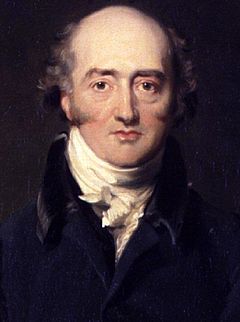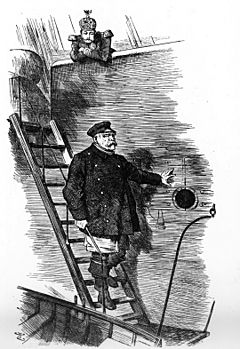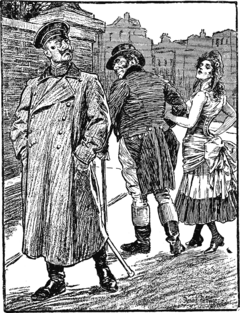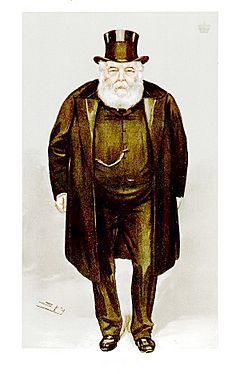Splendid isolation facts for kids
Splendid isolation was a way Britain handled its foreign policy in the 1800s. It meant avoiding long-term alliances with other countries. This idea was especially popular when Lord Salisbury was in charge, from 1885 to 1902.
The idea of "splendid isolation" started around 1822. That's when Britain left the Concert of Europe, a group of powerful countries formed after 1815. This policy continued until 1902, when Britain signed the Anglo-Japanese Alliance. It also changed with the 1904 Entente Cordiale with France.
During this time, Europe was splitting into two main groups. Britain eventually joined France and Russia, forming the Triple Entente. They were against Germany, Austria-Hungary, and Italy, who formed The Triple Alliance.
A Canadian politician named George Eulas Foster first used the phrase "splendid isolation" in January 1896. He liked that Britain stayed out of European problems. He said Britain "stands splendidly isolated in Europe."
Historians still discuss if this policy was planned or just happened. They also debate how much it affected things, or if it was just a catchy phrase.
Contents
Why Britain Stayed Apart

In the 1800s, Britain usually didn't make lasting alliances with other big countries. Some historians say this started after 1822. That's when Britain left the Concert of Europe after the Congress of Verona. Foreign Secretary George Canning guided this decision.
His main ideas shaped British foreign policy for many years. They can be summed up like this:
Don't interfere in other countries' problems. No European police system. Every nation for itself. Keep the balance of power. Respect agreements, but be careful making new ones. England is not Europe; Europe ends at the Atlantic, but England begins there.
For most of the 1800s, Britain wanted to keep the balance of power in Europe stable. It also needed to protect its trade routes to its colonies. This was especially true for routes to British India through the Suez Canal.
In 1866, Foreign Secretary Lord Derby explained this policy. He said Britain should be friendly with all nations. But it should not get tied down by any single alliance. Most importantly, it should not meddle in other countries' internal affairs.
One big exception was the 1839 Treaty of London. This treaty recognized Belgium as an independent country. The ports of Ostend, Antwerp, and Zeebrugge were very important for controlling the English Channel. So, Britain promised to protect Belgium's independence, even with military force. This promise led Britain to join World War I in 1914.
Germany and Britain's Policy
After Germany became a united country in 1871, its leader, German Chancellor Bismarck, formed alliances. In 1873, he created the League of the Three Emperors. This group included Austria-Hungary, Russia, and Germany.
The League broke apart in 1878 because Austria and Russia disagreed over the Balkans. Germany and Austria-Hungary then formed the Dual Alliance in 1879. Italy joined them in 1882, making it the Triple Alliance.
Bismarck wanted to avoid fighting a war on two fronts. His main goals were to be friends with Russia and keep France isolated. He even got Austria and Russia to rejoin a new League of the Three Emperors in 1881. Even after this League ended in 1887, Bismarck made a secret deal with Russia called the Reinsurance Treaty. This meant they would stay neutral if France attacked Germany or Austria-Hungary attacked Russia.
British Prime Minister Lord Salisbury once described his foreign policy. He said it was like "floating lazily downstream, putting out the occasional diplomatic boathook." This meant avoiding war with other big powers. It also meant keeping trade routes to the British Empire safe.
A constant worry for Britain was Russia trying to get access to the Mediterranean Sea. This involved places like Constantinople and the Dardanelles. This issue caused the 1853–1856 Crimean War. It came up again during the 1875–1878 Great Eastern Crisis. At that time, strong feelings of jingoism (extreme patriotism) showed that British people and politicians felt less secure.
After Britain took control of Egypt in the 1882 Anglo-Egyptian War, it made agreements with Italy and Austria-Hungary in 1887. These were called the Mediterranean Agreements. They weren't formal treaties. They were just promises to talk if problems came up. This meant Parliament didn't need to approve them. Britain shared Austria's worry about Russia expanding in Southeast Europe. Since Austria usually followed Germany, this allowed Salisbury and Bismarck to work together without a formal alliance.
In 1885, Russian troops took over an oasis near the border between Afghanistan and Russian-controlled Turkmenistan. This event was called the Panjdeh incident. Britain always worried about threats in this area and threatened to fight. But both sides eventually backed down and found a peaceful solution. However, the Ottoman Empire refused Britain's request to let warships into the Black Sea. All other European powers strongly supported the Ottomans. One historian said this was "the most formidable display of Continental hostility to Britain between Napoleon's day and Hitler's."
End of Isolation

After 1871, Germany grew stronger in industry and military power. British politicians were worried but felt better because Bismarck tried to keep things stable. For example, he signed the 1890 Heligoland–Zanzibar Treaty. But when Wilhelm II fired Bismarck in 1890, it made international politics less certain. At the same time, Britain faced many challenges around the world.
The Ottoman Empire was weakening, which caused problems in the Near East and the Balkans. Other European powers wanted to expand there. In East Africa, Britain and France almost fought in the 1898 Fashoda Incident. In Southern Africa, the Boer Republics were becoming very restless.
Russia was expanding into Central Asia and getting close to British India. Both countries also competed in Persia. In China and East Asia, Britain's economic interests were threatened by countries like Japan, Russia, and the United States.
The biggest problem was Germany. Kaiser Wilhelm II wanted to challenge the Royal Navy, leading to a naval arms race. His aggressive statements and unpredictable foreign policy caused many issues. He wanted Germany to get "compensation" in Africa, China, and the Pacific. He also offered military support to the Boers and increased Germany's influence in the Ottoman Empire. Wilhelm wanted to end "Britain's free ride on the coat-tails of the Triple Alliance."
Britain Forms New Friendships

In 1898, Joseph Chamberlain, the Secretary of State for the Colonies, tried to make an alliance with Germany. He publicly spoke about Britain's difficult situation. He said, "We have had no allies. I am afraid we have had no friends... We stand alone." This attempt failed. But it showed that Britain was realizing its isolation was dangerous. This was especially clear during the 1899–1902 Second Boer War.
Historians say that in 1900-1902, the British government debated what to do. Chamberlain wanted to end Britain's isolation by joining Germany. But Salisbury didn't want to change. When a new crisis happened in China (the Boxer Rising) and Lansdowne became Foreign Secretary in 1900, those who wanted change gained power. Lansdowne tried to make deals with Germany and Russia, but failed. In the end, Britain made an alliance with Japan.
In 1902, Britain and Japan signed the Anglo-Japanese Alliance. This meant if one country was attacked by a third country, the other would stay neutral. If attacked by two or more enemies, the other would help. This allowed Japan to count on British help if it went to war with Russia. This was important if France or Germany, who also had interests in China, decided to join Russia. Britain was still fighting the Boer War, so this alliance was more about defense than ending isolation. Some historians agree, saying it helped Britain stay separate from European alliances.
A peaceful solution to the Venezuela issue in 1897 led to the 1901 Hay–Pauncefote Treaty. This treaty was about the Panama Canal. Britain quietly accepted that the United States was in charge of the Americas. Just as the Anglo-Japanese Alliance let the Royal Navy reduce its ships in the Far East, it also greatly reduced its presence in the Caribbean.
The 1904 Entente Cordiale with France and the 1907 Anglo-Russian Convention were not formal alliances. They mainly focused on colonial borders in Asia and Africa. But they opened the door for cooperation in other areas. This made it very likely that Britain would join any future conflict involving France or Russia. These agreements together became known as the Triple Entente.
In the 1911 Agadir Crisis, Britain supported France against Germany. By 1914, the British army and navy were ready to help France if war broke out with Germany. But even within the government, few people knew how deep these commitments truly were.
What Historians Think
Diplomatic historian Margaret MacMillan believes that by 1897, Britain was indeed isolated. But she argues it was not "splendid" at all; it was a bad situation. Britain had no true friends and was arguing with the United States, France, Germany, and Russia.
Historians have debated if Britain's isolation was planned or if it just happened because of events. A. J. P. Taylor said it only existed in a limited way. He claimed Britain stopped worrying about the balance of power in Europe, thinking it would fix itself. But Britain stayed connected with European powers for issues outside Europe, especially in the Near East. John Charmley thought "splendid isolation" was a made-up idea before the Franco-Russian Alliance of 1894. After that, he said, Britain followed it unwillingly.
E. David Steele says that when Salisbury used the term "splendid isolation," he was being sarcastic. He was making fun of those who believed it was possible to be completely separate. Another writer says the term "unfairly stuck to (his) foreign policy." Salisbury himself did not like the term, thinking it was dangerous to be totally uninvolved in European affairs.
See also
 | Frances Mary Albrier |
 | Whitney Young |
 | Muhammad Ali |


